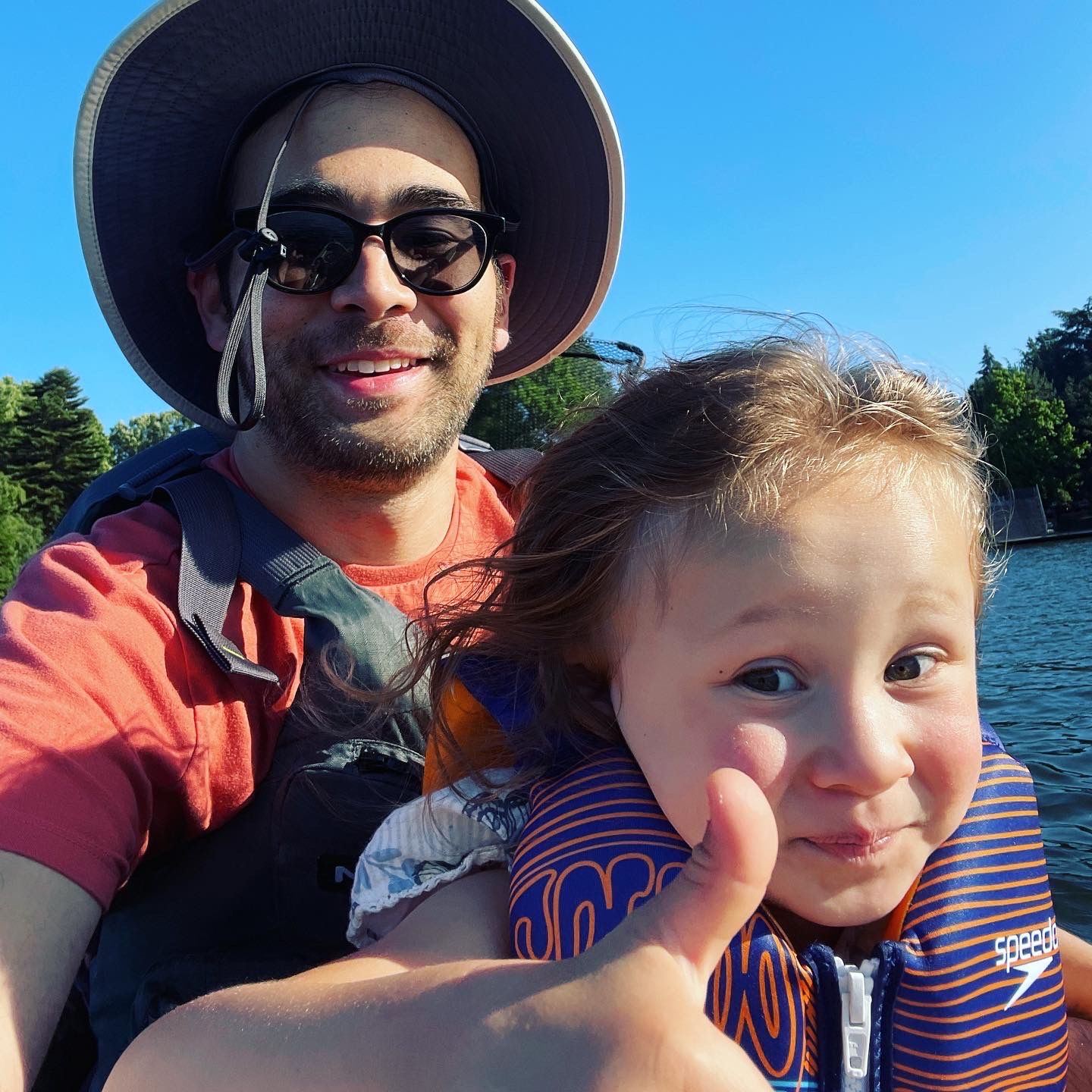I'm taking the path of the unknown
Experiences of being bullied in school, challenges as an adult and parent, and ultimately gaining perspective through curiosity and a passion to learn.

How my challenges with neurodiversity, becoming a parent, and passion for learning and understanding have inspired me to take a new path in life.
Growing up, I thought I’d always seen the world in black and white: things were either right or wrong, all or nothing. An in-between didn't exist. From a young age, my cultural upbringing certainly influenced my worldviews—my father is a first-generation Japanese baby boomer, and I spent a large portion of my childhood going to Catholic Church.
As I entered grade school and became more self-sufficient, my binary way of thinking started to introduce challenges. For example, being presented with more than two options or possibilities was very—and still is today—overwhelming. Situations under pressure like taking a timed test in school would feel paralyzing. I'd feel stuck and unable to make a choice. Today I often react the same way when faced with a decision—whether it’s related to a difficult situation with my daughter, an issue at work, or if my plans suddenly change. In these situations, I’ve learned that I simply need more time than the average person to process the information presented to me.
Challenges in school and being bullied
As a neurodivergent diagnosed with Tourette Syndrome since childhood, and ADHD later in adulthood, I now realize that many of these challenges growing up in school were partially caused by a deficiency in executive functioning. School was never easy for me, and I have very few positive experiences from it. I was bullied often—laughed at, pointed at, or stared at by other kids when they saw me ‘ticcing’. One of my most vivid memories of being bullied occured while on the school bus.

I had to be no more than five or six years old at the time, because I remember being too short to see over the seat in front of me. As I began ticcing, a kid sitting in front of me turned around, looked down at me, and started laughing and pointing. That feeling of shame and embarassment would stick with me throughout school and beyond.
In school, I’d make attempts to hide in the bathroom or behind a building pylon during recess so that kids wouldn’t see me tic. Around the fourth grade, there was one kid in particular that would go out of his way to follow me during recess, mimic my tics, and push me around physically. I also remember being pushed into the dirt and against the wall a few times by him, just waiting for the recess bell to ring so that I could have some peace.
It also didn’t help that my teachers—who I was supposed to look up to—were not supportive. When being picked on by other kids in the classroom, my typical response was “shut up”, in hopes that they’d leave me alone. However, I was the one who usually got in trouble because the teacher would hear me say shut up and chastise me for it, while the bullies got away scot-free. And instead of speaking up, I'd take the blame.
Those are just a few of the many negatives experiences I had in school. As an adult, those experiences have brought on chronic feelings of fear, anxiety, and paranoia. While in public, I often have a feeling that people are looking at me like I'm some weirdo. I've learned to adapt by acting “normal” and suppressing my tics, which just ends up creating more anxiety until I'm able to find a safe place to let them out.
The silver linings, and being a neurodivergent parent
Stay with me here—I know this all sounds pretty grim, but it gets better. Once I became a parent (and eventually a single parent), a whole new set of challenges arose. Everything I thought I knew about life, or how to approach it, instantly got thrown out the window because I’d now become responsible for raising another human being. This journey of raising a beautiful, high-energy 4-year-old girl has been both exciting and exhausting, full of constant changes and new experiences. I used to hate clichés growing up, but I can fully attest to the common saying “as a parent, one thing gets easier, and another thing gets harder”.
Amidst the constant learning and surprises that come with parenting, and in parallel with therapy, I started to gain a level of self-awareness about myself that I’d never had before. In this, I discovered a silver lining to being neurodivergent: I really don’t see the world in black and white like I once thought I did. In fact, I am quite the opposite—an incredibly curious, creative person, always seeking to understand the grey area that exists in between the extremes.

When I was younger, I’d satisfy this creativity and curiosity to learn by challenging myself. At age 11, I self-taught myself to create a website. In the fourth grade, I created a PowerPoint presentation for my elementary school’s board and presented it to them. Growing up, I loved playing with LEGO, obsessing about specific topics like World War II, reading non-fiction cross-section books, finding new music, and religiously watching Mythbusters and How It’s Made.
In the work environment as an adult, I’m often looking at the grey area, seeking new ways to approach or think about something. It’s become a massive asset in building my creative and strategic skills. I love learning about a highly technical topic, coming up with an interesting idea based on it, and then building an entire strategy around it to make it easier to understand. Just a few days ago, I was complimented by a colleague for my ability to create ideas, and then run with them without needing direction. I really enjoyed hearing that my work is valued.
At home, I love to write, look at data and analyze it, design, build and tinker with things, and learn a new hobby. It's my way of understanding how the world works, and the complexities of life.
Taking the path of the unknown
Over time, I've discovered that my curiousity and passion for learning extends far beyond material things. Equally fascinating are the billions of people that make up this planet, each with their own unique, perspective-building stories
Trying to understand, connect with, and help people excites me. At the same time, it helps me understand myself as I've always been one to gain perspective through others. And by understanding myself, I'm able to gain awareness to be a better parent.

More than anything, I want to be able to support my daughter through difficult situations, and help guide her so that she grows up confident and strong. I want to be there for her when she inevitably gets bullied, because every kid does at some point. Or when she just has a bad day at school. But it's really, really hard to do that if I can't even be there for myself at times.
After doing a lot of thinking about my passions, a really challenging past nine months learning a new job, and a desire to be more present for my daughter, I've decided to quit my job. I'm incredibly grateful for everything that I learned in such a short amount of time and the people I met—but I'm ready to jump into the in-between: that grey area of unknowns that I thought I was so against.
I'm starting a new job and college in the fall, with the intention of exploring a new career path in the field of psychology. Maybe I'll end up being a mental health counselor. Or a childhood development psychologist. Or an educator that works with neurodivergen children. I'm not quite sure, and I'm both excited and nervous.
I'll end this with a quote I found earlier, I think it sums up where I'm at:
“The path to our destination is not always a straight one. We go down the wrong road, we get lost, we turn back. Maybe it doesn’t matter which road we embark on. Maybe what matters is that we embark.” — Barbara Hall
❤️